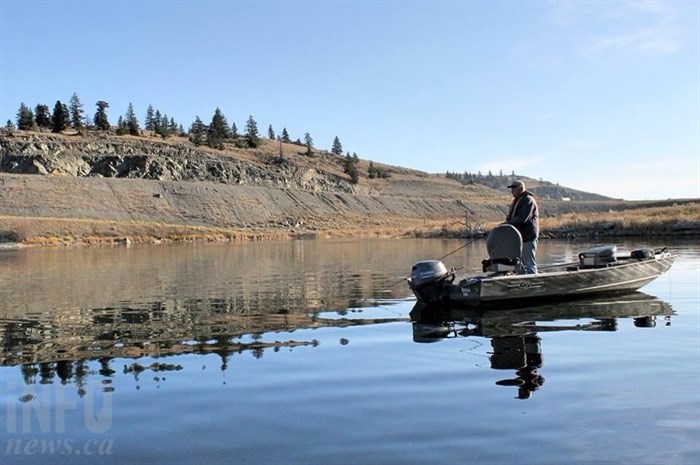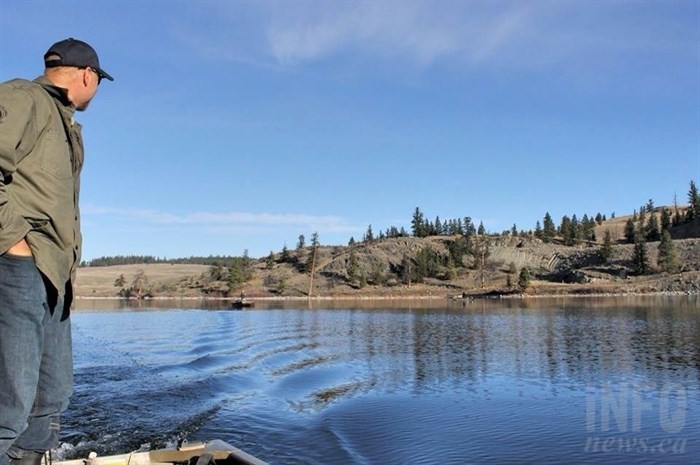
The view from the dam at Jacko Lake's Outlet Bay.
(GLYNN BROTHEN / iNFOnews.ca)
October 30, 2015 - 11:30 AM
KAMLOOPS - The Lac Le Jeune Road exiting Kamloops is a paved road leading to a host of lakes in the region, but the turnoff to nearby Jacko Lake is full of bumps. It’s windy and dusty, but a tranquil glossy fishing hole is your reward at the end of the drive.
The area is less than half an hour out of town and adjacent to where the proposed Ajax Mine is set operate. It's been a fishing lake since at least the 1950s and links to the nearby Peterson Creek which eventually flows into the Thomspon River.
Stephen Maricle, a biologist with the Department of Fisheries and Oceans, has visited the lake since he was in high school. In addition to the recreational trips he still takes to the lake he often checks the lake’s levels at the dam for work.
He says there have been many misconceptions about the lake over the years.
“One of the biggest misconceptions is that this lake is man-made. It’s not; it’s man-enhanced,” he says.
The dam on Outlet Bay — a narrow arm of the lake — has been operating since its construction in the early 1950s. The dam was previously used for agricultural irrigation with Peterson Creek and could be replaced if the KGHM Ajax Mining project moves forward, Maricle says.
According to ministry data the lake has expanded three times, through agriculture and mining projects in the area and via dams, with its largest increase a growth of 17 per cent in the 1970s.

Lloyd Harwood spends the morning of Oct. 23 fly fishing at Jacko Lake.
(GLYNN BROTHEN / iNFOnews.ca)
Jacko is one of several lakes in the area, but Maricle says it has many unique features which separate it from the remaining 1,100 fresh water lakes in the region. It is one of only 12 lakes in the grasslands and is 46 hectares in size, which Maricle says make for prime fishing areas.
“The water chemistry in Jacko Lake is superior to most lakes. It has an extremely productive water chemistry and can produce fish over 10 pounds,” Maricle says.
With depths around 24 metres, the lake doesn't have a winter-kill when it freezes over either.
While the lake fosters a breeding area for the fish, the province has been stocking it annually since the 1950s with two types of trout. Each year the waterway receives 5,000 sterile Fraser Valley trout and up to 15,000 Pennask trout, which Maricle says flourish best in the shallow shoals of the lake.
There were fish in the lake before the province began stocking it, he notes, but there are no records from the time.
The water body and the roadway leading to the lake is Crown-owned, but the remaining areas surrounding it have been owned by a number of mining companys — currently KGHM. Private mining projects and re-routing the creek linked to Jacko Lake have resulted in Maricle and other biologists consulting about potential environmental impacts to the lake, specifically an area named Mine Bay, one of the key angling spots according to Maricle.

Fisheries biologist Steve Maricle looks at Mine Bay, an area well-known to local fishermen.
(GLYNN BROTHEN / iNFOnews.ca)
The area’s ownership is also in dispute with Stk’emlupsemc of the Secwepemc Nation, a group that represents the Skeetchestn First Nation and Tk’emlúps te Secwepemc, claiming title. The group said they would be claiming title on the lands, which is considered a ‘cultural keystone area’ known as Pípsell, back in June and officially filed a title claim on a portion of the site, including Jacko Lake, last month.
KGHM spokesman Robert Koopmans has previously said the title issues are complex and that the company plans to work with local First Nation bands.
KGHM has submitted an environmental application. If it’s accepted as complete, the Ajax product will undergo a 180-day review, during which environmental groups and members of the public can provide input.
If approved, the open-pit copper and gold mine will operate immediately southwest of Kamloops and adjacent to Jacko Lake.
To contact a reporter for this story, email Glynn Brothen at gbrothen@infonews.ca, or call 250-319-7494. To contact the editor, email mjones@infonews.ca or call 250-718-2724.
News from © iNFOnews, 2015